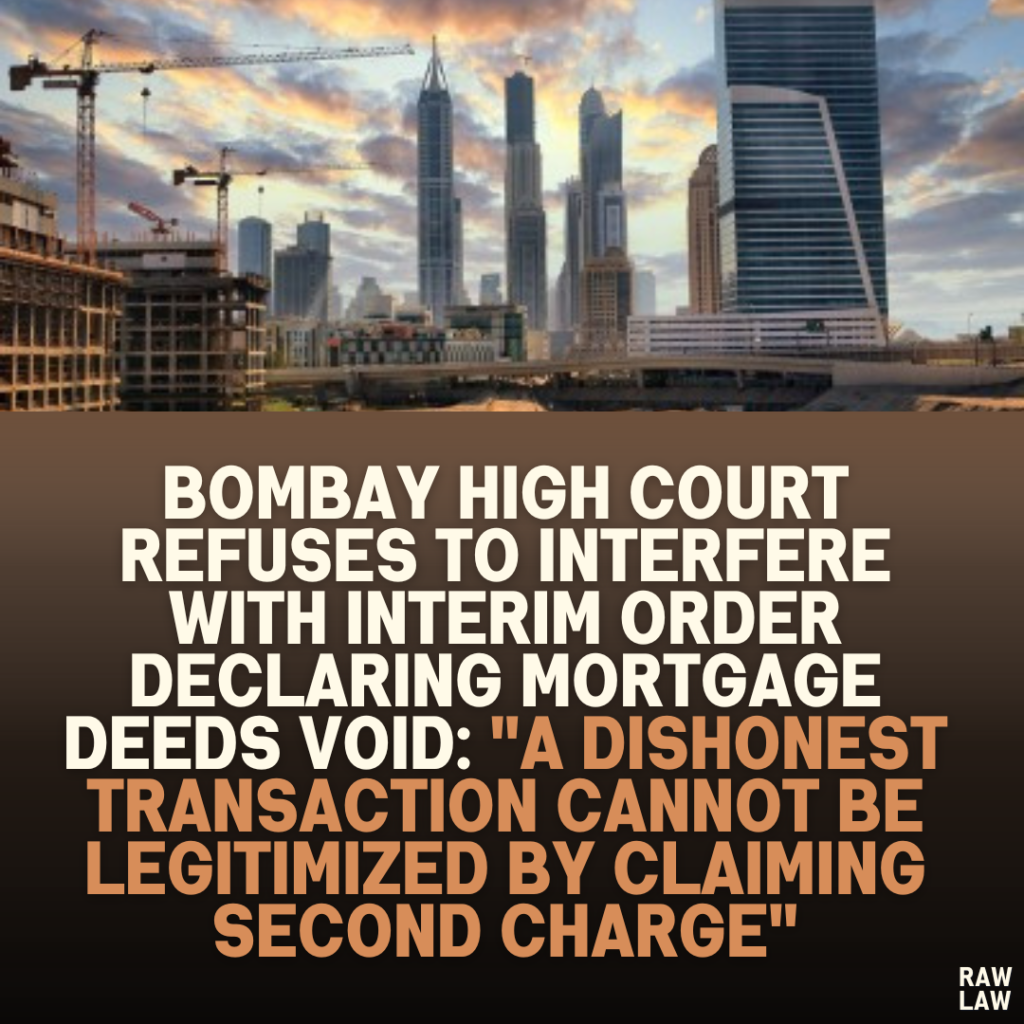Court’s Decision:
The Bombay High Court dismissed a commercial appeal challenging interim reliefs granted by a Single Judge in a suit concerning conflicting mortgage rights. The Court upheld the finding that the subsequent mortgage created in favour of the appellant (Omkara Asset) was voidable at the instance of the respondent (J.C. Flowers) and refused to interfere with the Single Judge’s discretion. It held:
“The conduct of Sumer is dishonest. The claim of J.C. Flowers cannot be defeated in such a manner… which would virtually amount to putting a premium on a dishonest transaction by holding that Omkara Asset still is entitled to a second charge.”
Facts:
- The dispute arose from loans granted by Yes Bank (later assigned to J.C. Flowers) to Sumer Radius Realty and Sumer Buildcorp.
- Yes Bank extended facilities aggregating ₹700 crores through term loans TL1, TL2, and TL3, secured by mortgage deeds over properties in Santacruz and Bandra (the “Suit Property”).
- In 2018, Piramal Capital sanctioned fresh loans totalling ₹2000 crores to the same borrower group and obtained mortgage deeds over the same property a day before Yes Bank issued a conditional NOC for release of charge.
- Yes Bank’s NOC, dated 31 July 2018, required repayment before 10 August 2018 and would otherwise stand revoked.
- The borrowers defaulted, prompting Yes Bank to withdraw the NOC and issue a recall notice.
- J.C. Flowers, having been assigned Yes Bank’s loans, sought declarations that the Piramal/Omkara mortgage deeds were void and illegal.
Issues:
- Whether the mortgage deeds executed in favour of Piramal Capital (later assigned to Omkara Asset) without complying with conditions of the earlier mortgage were valid or void.
- Whether the subsequent mortgage could be treated as subservient (second charge) under Clause 5 of the original mortgage deeds.
- Whether jurisdiction lies with NCLT or the Civil Court for deciding the validity of such mortgage deeds.
Petitioner’s Arguments (Appellant – Omkara Asset):
- The relief of cancellation of mortgage deeds had been dropped from the plaint, and hence declaratory relief could not be sought.
- Under Section 31 of the Specific Relief Act, the court can only cancel an instrument if it is void/voidable and likely to cause serious injury.
- Clause 5 of the earlier mortgage explicitly permitted subsequent mortgages but clarified they would rank inferior; hence, Omkara’s mortgage should be recognized as a second charge, not void.
- Cited Section 48 of the Transfer of Property Act to argue for the recognition of subsequent rights.
- Argued that the NCLT had exclusive jurisdiction under Section 60(5)(c) of the IBC to decide such priority disputes.
Respondent’s Arguments (J.C. Flowers):
- The mortgage deeds in favour of Omkara were executed even before Yes Bank’s conditional NOC and thus in violation of contract terms.
- The deeds wrongly represented that the mortgaged property was free of charge, breaching the borrowers’ obligations under prior agreements.
- Allowing such mortgages to stand would defeat J.C. Flowers’ exclusive charge and amount to encouraging fraudulent conduct.
- NCLT does not have jurisdiction to determine the validity (as opposed to priority) of the impugned mortgage deeds.
- Relied on the principle that any disposition of rights in violation of a prior exclusive charge is voidable.
Analysis of the Law:
- The Court noted that under Section 31 of the Specific Relief Act, a document can be cancelled if it is void/voidable and its continuance may cause serious injury.
- Citing Section 23 of the Indian Contract Act and Section 6(h) of the Transfer of Property Act, the Court held that the impugned deeds violated the public policy and terms of the earlier mortgage, making them voidable.
- Referred to key clauses in the financing documents, such as:
- Clause 5 of the mortgage deed, restricting further encumbrance without written consent.
- Clauses 10(B) and 13(d), which prohibited any further charge without permission.
- Affirmed that even though Clause 5 mentions that any subsequent charge shall rank inferior, this presumes valid creation of the mortgage—which was absent here due to non-compliance with preconditions.
Precedent Analysis:
- Bikram Chatterji v. Union of India (2019) 19 SCC 161: Held that mortgages executed in violation of conditional permissions are not valid.
- Deccan Paper Mills v. Regency Mahavir Properties (2021) 4 SCC 786: A document can be cancelled under Section 31 to prevent mischief.
- Radha Sundar Dutta v. Mohd. Jahadur Rahim (AIR 1959 SC 24): In case of conflict in document clauses, preference should be given to the earlier clause.
- The Court distinguished the decision of Mata Din Kasodhan (All HC, 1891) cited by appellant, holding it inapplicable in light of the present mortgage conditions and conduct of parties.
Court’s Reasoning:
- The appellant’s mortgage deeds were executed before the conditional NOC was even issued, in breach of contract.
- Sumer Radius and Buildcorp never repaid Yes Bank and did not obtain consent for subsequent mortgage creation.
- The appellant’s reliance on being a “second charge holder” ignored that a valid mortgage never came into existence due to non-fulfilment of conditions.
- The NCLT had no jurisdiction in this context as the challenge was to the legality of the mortgage, not priority among secured creditors under IBC.
- The learned Single Judge’s exercise of discretion was based on sound legal principles and could not be interfered with under appellate review.
Conclusion:
The Division Bench found that the appeal lacked merit and upheld the Single Judge’s interim order directing deposit of the impugned mortgage deeds and restraining Omkara Asset from acting on them. The appeal was dismissed.
Implications:
- This decision reinforces the principle that fraudulently or prematurely created security interests without fulfilling preconditions are not recognized in law.
- The ruling also emphasizes that contractual restrictions on the creation of further encumbrances must be strictly observed.
- It clarifies the jurisdictional boundaries between NCLT (for priority) and Civil Courts (for validity).
- The judgment sends a strong message against attempts to gain financial leverage through invalid secondary mortgages.



